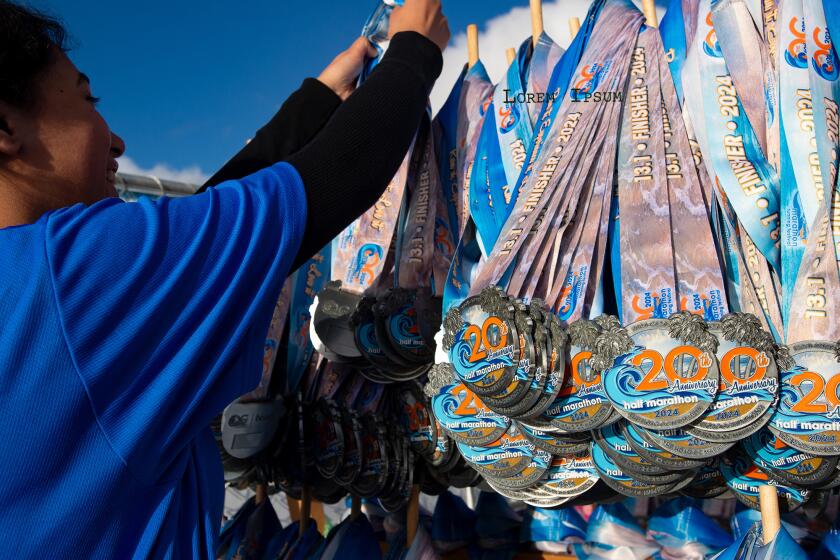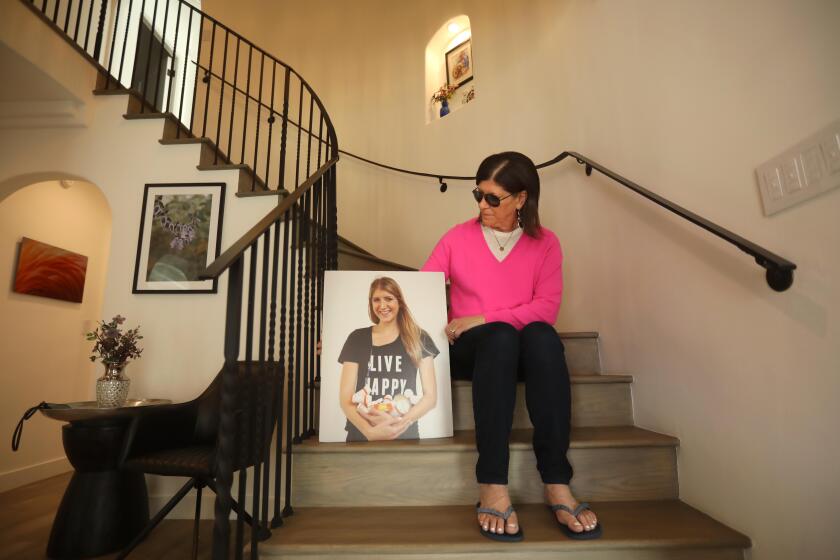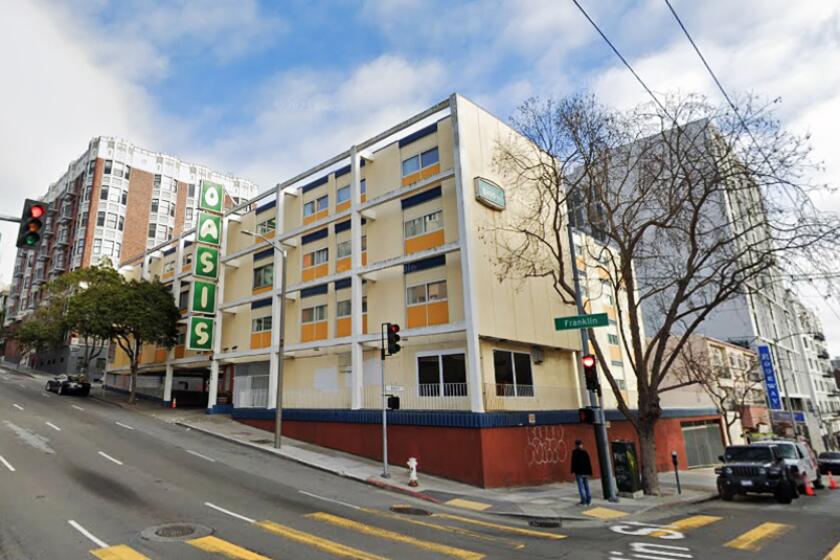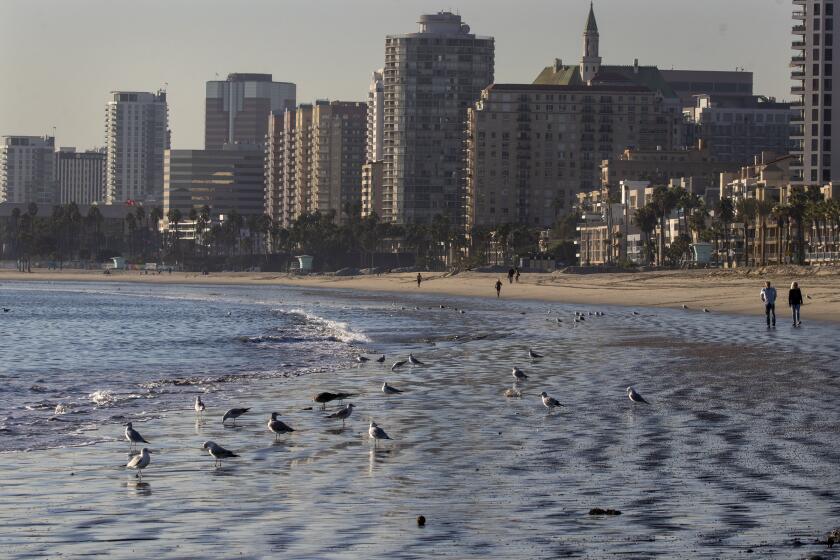Stores Fight Crime With Guards and Alarms : Security: Carjackers and gangs take aim at shopping areas in the Valley. Retailers say the extra protection is a necessary expense.
The three men entered the clothing store almost simultaneously, two through the front and the other through the rear. Dressed in gang attire--khaki pants, oversized white T-shirts and black sneakers--they weren’t the store’s typical customers.
“It was obvious what was going to happen,” said David Rosenberg, co-founder of the Centurion Group, a Glendale security firm. “They were either going for the cash register or they were going to grab some merchandise and head out the door.”
But before anything could happen, an off-duty police officer working for Centurion as a security guard at the store stepped in front of the intruders. “Once they saw the place had security, they made an about-face and beat out the door,” Rosenberg said.
Rosenberg won’t identify the store other than to say it is a medium-sized business in the Valley. But the incident exemplifies the type of security threat facing businesses in the Valley and the measures they are taking to combat them. Some are costly, such as hiring armed guards for up to $19 an hour or installing sophisticated alarm and lighting systems for thousands of dollars. Other methods are relatively inexpensive, such as forming anti-crime programs with the aid of schools, law enforcement and other businesses.
Police, security experts and business owners say that shoplifting and employee theft are no longer all that small-business owners and retailers have to guard against. These days, the trend is toward violent crimes ranging from carjackings in customer parking lots to what law enforcement officials call “swarms” of intruders looting stores.
“The problem is getting worse and worse,” said Leif Lauritzen, president of Stores Protective Assn., a Simi Valley firm that advises companies on security measures. “Every metropolitan area is seeing the same thing, but the San Fernando Valley is probably seeing a quicker change because demographics are changing so quickly there. It has become like everywhere else in Los Angeles.”
Carjackings alone increased 10% in Los Angeles between 1990 and 1992 with a majority of them occurring in shopping areas, said Detective Ray Broker, head of the LAPD Foothill Division’s robbery unit. Some of the Valley’s most notorious carjackings this year have occurred in the parking lots of a bank in Sherman Oaks and a Pic ‘N’ Save in Canoga Park and at a gas station in Chatsworth.
“The reason for that is people who go shopping also have money and wallets,” Broker said. “So the robber can get more than just the vehicle.”
“There’s a lot of concern about carjacking and hijacking in parking lots,” said J. Richard Leyner, president of the Encino Chamber of Commerce. A carjacking can be “the death of a shopping center,” he added.
To combat such problems, business owners are countering with a host of measures.
One supermarket in Van Nuys enhanced security in its parking lot by spending several thousand dollars on better lighting. A Ralph’s market in Woodland Hills has worked closely with neighboring Taft High School to prevent mobs of students overrunning the store. Business owners along Sepulveda Boulevard in Van Nuys persuaded the phone company to block incoming calls at pay phones as part of a campaign against drug sales.
Convenience store chains have long battled against serving as hangouts for teen-agers and vagrants. Operators of convenience stores in the Valley have responded by improving lighting, removing pay phones and even blaring Muzak out of loudspeakers to scare teen-agers away from store entrances. “The Muzak is another tool in our toolbox,” said Kevin Eliason, assistant loss prevention manager for the Greater L. A. Division of Southland Corp., 7-Eleven’s parent.
The most prevalent security tool these days, however, is the most obvious: security guards. Even small stores in strip malls are finding room in their limited budgets for guards.
Cissy Wechter, owner of the Flair boutique in Encino, said she became concerned after hearing about local cases involving bands of thieves who scattered through stores, distracted staff and made off with merchandise. “When my salespeople heard about that, they got really nervous,” she said.
“Since we stay open until seven, they were uncomfortable because they’re in the store during evening hours and stores are vulnerable at the end of the day and when they’re getting ready to close.”
Wechter’s response was to hire off-duty police officers to work as security guards during the late-afternoon hours. “It’s just a secure feeling knowing we have someone there who was capable of doing something if there was a problem.”
Tenants of an Encino shopping mini-mall asked their landlord for additional security after a customer’s car was burglarized in the parking lot and female customers complained of being approached by vagrants asking for money. Now a uniformed security guard is on duty until 11 every night instead of just on busy days, said Hal Alpert, owner of Jolie, a women’s clothing store in the complex.
For Randy Landsberger of Alpine Shutter Inc., the problem was the regular vandalizing and painting of graffiti at the Sun Valley warehouse of his custom window-covering firm. “We’d paint (the graffiti) over the next morning and it would be back up in three days,” he recalled. “We knew who was doing it, but we couldn’t do anything.”
In mid-May Landsberger hired nighttime security guards and so far it seems to have paid off. “Since we got security, I believe we’ve had one incident which was very minor. . . . Given the inconvenience (of the graffiti), the broken glass, the beer bottles, it was definitely worth it.”
But business owners tread a fine line with such measures. For one thing, security, particularly uniformed guards, can be expensive and the costs are often passed on to customers. According to Lauritzen, store security generally is estimated to account for 16 cents of every dollar spent in stores “and that’s probably conservative right now.”
There’s also concern about security measures becoming oppressive to customers. As Lauritzen said, “Security does lend a certain feeling of comfort. But you can only do so much. In a sense, security can become counterproductive. Not everybody wants to shop in an armed camp.”
More to Read
Start your day right
Sign up for Essential California for news, features and recommendations from the L.A. Times and beyond in your inbox six days a week.
You may occasionally receive promotional content from the Los Angeles Times.






